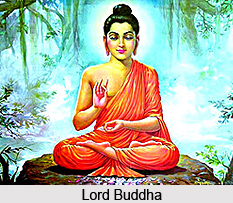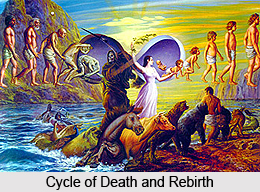 Karma in Sanskrit means `action.` The term is used to refer to volitional acts as well as the forces that arise from these acts. According to the Indian philosophy Karma is responsible for the entire chain of causes and effects and rebirth. The concepts of rebirth, moksha and samsara are closely associated with the principle of Karma. Indian philosophy mainly includes the postulates of Hinduism, Jainism and Buddhism. Although these Indian religious beliefs differ from each other but the concept of Karma is primarily similar.
Karma in Sanskrit means `action.` The term is used to refer to volitional acts as well as the forces that arise from these acts. According to the Indian philosophy Karma is responsible for the entire chain of causes and effects and rebirth. The concepts of rebirth, moksha and samsara are closely associated with the principle of Karma. Indian philosophy mainly includes the postulates of Hinduism, Jainism and Buddhism. Although these Indian religious beliefs differ from each other but the concept of Karma is primarily similar.
According to the Indian philosophy the law of `karma` is not imposed from without; it is worked into the very nature of the human being. The formation of mental habits, the increasing proneness to evil, the hardening influence of repetition which undermines the effective freedom of the self in the conscious, subconscious and unconscious mind of human beings are comprehended under the law of `karma``. The human mind is unable to set himself free from the effects of their very actions. The past is the initiation of the present and the future. The law of `karma` is the principle working out justice in human relations. The difference of `Karma` distinguishes one person from another. This explanation reveals how people are bound to clear their old debts of destiny or the happiness that the person is enjoying is the fruit of his own `karma`.
The perceptions of Hinduism and Buddhism about `karma` are quite similar. According to Hinduism `Karma` refers to a person`s deeds. These may be either good or bad. The karma of a person is, hence, responsible for the chain of cause and effects. This philosophy is explained by Lord Krishna in Bhagavad Gita. Moreover it is the `karma` that determines the rebirth or reincarnation. Hinduism states that rebirth results from a person`s desire to enjoy the worldly pleasures. So the immortal soul goes through the process of leaving one body and entering the other. However, after many births the person is tired and it is then that he seeks salvation.
 The Buddhist definition of `karma` is similar to the Hinduism. Buddhism dissociates `karma` and results completely. Rather it states that a person`s acts are depended on motives. And it is the motivations that decide the course of the action. But to differentiate between a good and a bad motive, enlightenment is required. Buddhism differs from Hinduism where the theory of rebirth is concerned. In the strictest terms Buddhism negates the idea of a permanent self. Rather it propagates that all the components of the human body and personality will dissipate sooner or later. Hence the transmigration of soul is not possible. But Buddhism does discuss a subtle concept of rebirth but it differs from the Hindu concept of reincarnation as the former negates the existence of an immortal soul or `atma.`
The Buddhist definition of `karma` is similar to the Hinduism. Buddhism dissociates `karma` and results completely. Rather it states that a person`s acts are depended on motives. And it is the motivations that decide the course of the action. But to differentiate between a good and a bad motive, enlightenment is required. Buddhism differs from Hinduism where the theory of rebirth is concerned. In the strictest terms Buddhism negates the idea of a permanent self. Rather it propagates that all the components of the human body and personality will dissipate sooner or later. Hence the transmigration of soul is not possible. But Buddhism does discuss a subtle concept of rebirth but it differs from the Hindu concept of reincarnation as the former negates the existence of an immortal soul or `atma.`
The `Karma and rebirth` theory in Indian philosophy further opines that on the dissolution of the body after death, the well doer is reborn in some happy state in heaven. In some beliefs, heaven and hell are looked upon as temporary states before rebirth happens. Rebirth is defined as `jati` that connotes `birth` but in the Buddhist cosmology there is no word that exactly defines `rebirth`. It is depicted as "punarbhava" in Sanskrit and "Punabbhava" in Pali that is the connotation of "becoming again". The early Buddism relies on the conception of rebirth of `Jatakas` relating the previous births of Buddha and the many deeds of self-sacrifice by which he prepared himself for the final victory over evil in the great conflict under the Bo tree. The individual can achieve the ability to view the infinite past by the possession of certain supernatural power that can be attained with great effort and perseverance. In Buddhism, the existence of the migration of the soul or the passage of an individual from life to life is not cogitated. The physical entity of an individual perishes with the dissolution of the psychic. The character of an individual continues to long.
The concept of Karma in Janism is different from those depicted in the Hindu philosophy and Western schools of thought. According to the Jain school of belief, the Karma is the result of karmic dirt that involves subtle microscopic elements that are termed as `pudgala`. Karma is described in Tattvarthasutra, Jain scripture, as "a mechanism that makes us thoroughly experience the themes of our life until we gained optimal knowledge from them and until our emotional attachment to these themes falls off." According to Jainism Karma is a self-sustaining mechanism as natural universal law, without any need of an external entity to manage them. The change of the thought of a soul leads to the result of Karma i.e. the bad thought may lead to bad karma. So often the emphasis on "samyak dhyan" and "samyak darshan" is noticed in Jainism. According to Jain school of thought, each and every soul has the potentiality to attain "nirvana" and possesses the equal sanctity.
It is, thus, the karma that enables an individual to experience the pleasures and sorrows of life. As far as rebirth is concerned, Jainism states that a soul may transmigrate in search of the conditions that will bring about the fruits. This may continue for innumerable years. Hence a Jain who has accumulated good karmas will be born as a `deva.` But even this is not desirable as a `deva` is also subject to death and decay.
Besides these three religious beliefs Sikhism also opines about the theory of karma and rebirth. According to it all souls are under the influence of `Maya` which includes three shades of Rajas (mode of passion), Tamas (mode of ignorance) and Saatav (mode of goodness). These three qualities are responsible to keep the soul intact into the ground. These three aspects of Maya help the individual to perform their worldly affairs which are depicted as Karmas. According to the perception of Sri Guru Granth Sahib, Karma is the fruit of the deeds of the individual. This is the karma which determines the intimation of Pure Being in this life or the separation of soul and admits the doctrines of Karma and reincarnation as the facts of nature.
While the concept of `karma` is not implicit in Islam, this sect does discuss rebirth. Traditionally Islam rejects the concept of rebirth. But Sufism claims that the cycle of birth, death and rebirth is mentioned in the Holy Koran.
It would not, thus, be entirely wrong to affirm that the theory of karma and rebirth in Indian philosophy is an amalgamation of all these schools of thought. With time new criticisms have cropped up but the general believe in this theory has fundamentally remained unaffected.












